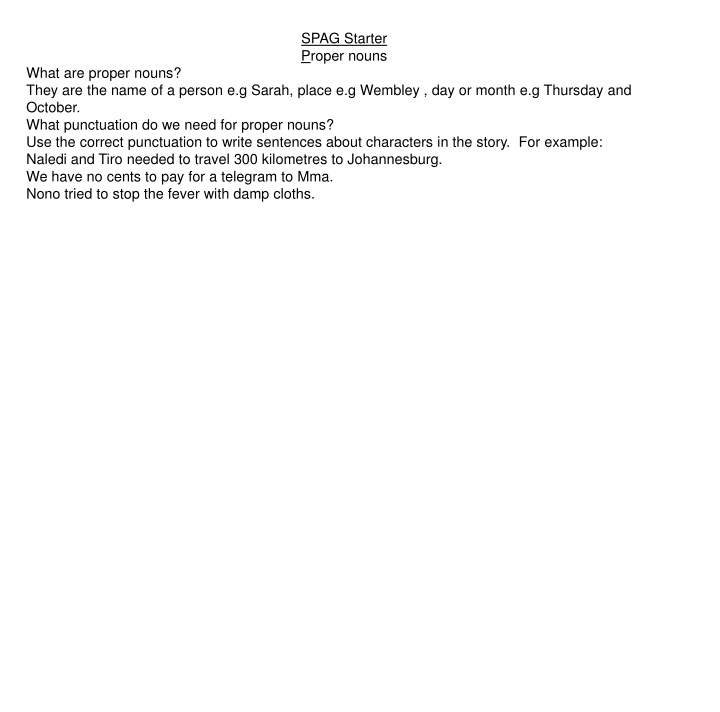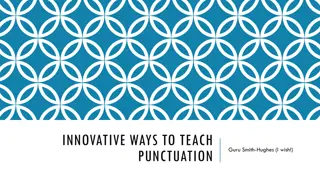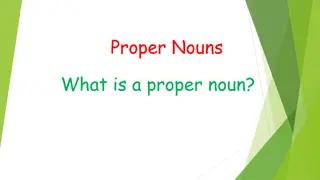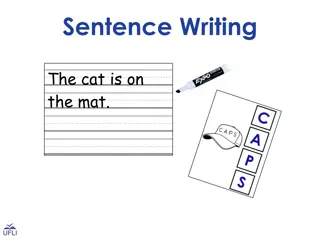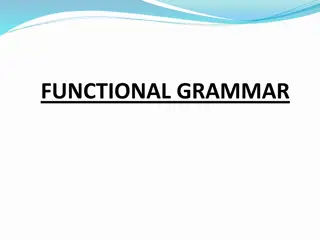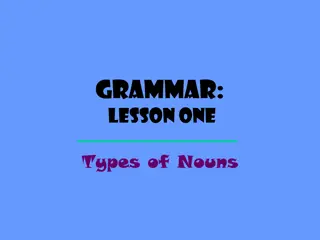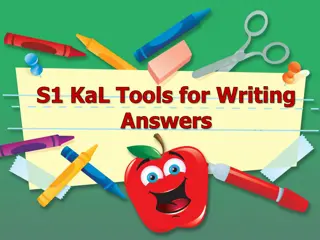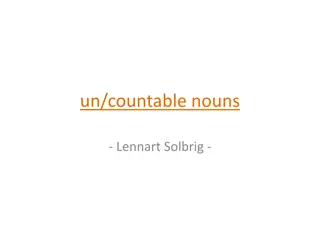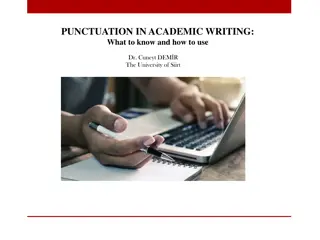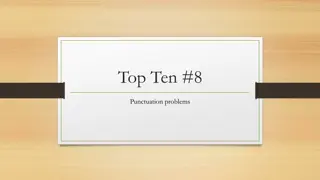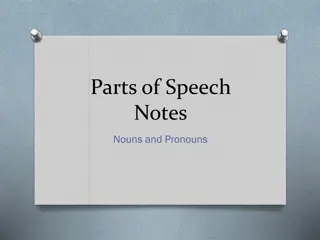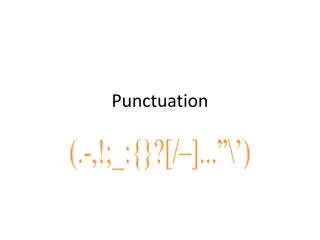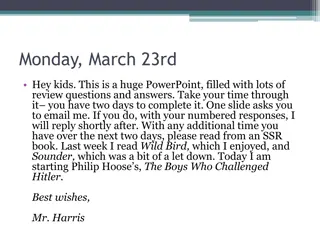Proper Nouns and Correct Punctuation Usage in Writing
Proper nouns are names of specific persons, places, days, or months, and they require capitalization. Proper punctuation is essential when writing sentences involving characters, locations, or events in a story. This content emphasizes the importance of using proper nouns and correct punctuation in writing to convey clarity and structure effectively.
Download Presentation

Please find below an Image/Link to download the presentation.
The content on the website is provided AS IS for your information and personal use only. It may not be sold, licensed, or shared on other websites without obtaining consent from the author.If you encounter any issues during the download, it is possible that the publisher has removed the file from their server.
You are allowed to download the files provided on this website for personal or commercial use, subject to the condition that they are used lawfully. All files are the property of their respective owners.
The content on the website is provided AS IS for your information and personal use only. It may not be sold, licensed, or shared on other websites without obtaining consent from the author.
E N D
Presentation Transcript
SPAG Starter Proper nouns What are proper nouns? They are the name of a person e.g Sarah, place e.g Wembley , day or month e.g Thursday and October. What punctuation do we need for proper nouns? Use the correct punctuation to write sentences about characters in the story. For example: Naledi and Tiro needed to travel 300 kilometres to Johannesburg. We have no cents to pay for a telegram to Mma. Nono tried to stop the fever with damp cloths.
Monday 28th September, 2020 L.O: To write a diary entry Success criteria: What would our success criteria be?
Use your green pen to self assess your writing based on the success criteria. Tick the boxes to show what you have achieved and give the evidence.
Teachers to model under visualiser. Writing over 2 days. How can we be specific to the culture? Dear Diary, Tomorrow I'm finally going to see Mma. I'm so excited. We've travelled all this way to get help because baby Dineo has been very ill.
What is good? What could be improved? *Remote learning L.O: To write a diary entry Dear Diary, Tomorrow will be the day that we finally get to see Mma. This journey of 300 kilometres has certainly been one that I will never forget. Tiro and I have been speared on by the fear of baby Dineo dying and knowing that we are doing the right thing. What choice did we have? I have always wondered why Mma worked so far in the city, but now I think I am beginning to understand. Our village life is very different and what chance would Mma have to get a job that would help pay for our school. We have been so lucky to have met some kind people on our journey. Firstly, the boy from the orange farm who allowed us to eat the oranges and stay in the shed for the night. Then there was Rra, who drove us 250 kilometres to Jo'burg in the lorry belonging to his baas. He even gave us money for the bus, where we met Grace who saved us from much trouble when we nearly got on a bus just for whites. She told us we had to wait at the bus stop for Non-Whites. I couldn't understand this and Grace freely spoke about how she felt. I remember Mma said, "The white people who make the laws don't allow it. That's how it is." This cannot be right. I so look forward to seeing Mma and getting help for Dineo. We have been so worried for her. From, Naledi
Tuesday 29th September, 2020 L.O: To write a diary entry Success criteria: What have we not included? Today, we will continue to write our paragraphs.
SPAG Starter Adjectives to describe feelings I'm feeling sad. I'm feeling happy. I'm feeling tired. What powerful synonyms can we use to describe our feelings?
Wednesday 30th September, 2020 L.O: To edit a diary entry What have we done well? What do we need to improve? Success criteria:
Thursday 1st October, 2020 L.O: To identify the culture and language in a text Success criteria: I can identify cultural vocabulary I can identify cultural settings I can understand the difference between literal and figurative language
* Remote learning - link to Chapter 7 https://www.youtube.com/watch?v=m7pm6bZPP0s https://www.youtube.com/watch?v=m7pm6bZPP0s Let's read Chapter 7 - Mma How are the children feeling after seeing their mother? How is their mother feeling? Up to pg 49 What reference to culture can we now make?
Literal information- where the author is simply stating facts. e.g. They stepped off the bus. What are the facts (literal)? This language is literal. Implied information- when the author is implying or inferring something. e.g. The street was lined with great leafy trees. What is being implied? What can we infer? This language is figurative.
What would be cultural vocabulary? What would be cultural context? Naledi looked up and saw a young boy, her own age. "What are you doing?" he demanded. He spoke in Tswana, their own language. "The white farmer could kill you if he saw you. Don't you know he has a gun to shoot thieves?" Key: Cultural vocabulary Cultural context
What would be cultural vocabulary? What would be cultural context? *Answers Naledi looked up and saw a young boy, her own age. "What are you doing?" he demanded. He spoke in Tswana, their own language. "The white farmer could kill you if he saw you. Don't you know he has a gun to shoot thieves?" Key: Cultural vocabulary Cultural context
L.O: To identify the culture and language in a text Choice Challenge: Use key to find cultural vocabulary. Create a key to find cultural vocabulary and cultural context. Explain two. Create a key to find cultural vocabulary and cultural context. Explain four. Extra for experts: Can you find any figurative language?
Friday 2nd October, 2020 L.O: To role-play a character's point of view Success criteria I can understand the cultural context of the story I can re-tell parts of the story
Chapter 8- The Police Can we summarise what has happened so far? *Remote learning - Chapter 8 https://www.youtube.com/watch?v=_qIAWlUtHLs https://www.youtube.com/watch?v=_qIAWlUtHLs Up to page 55
What was the role of the police in South Africa during Apartheid?
What has happened? Why was Tiro anxious? "Do you know what happened to us Mma?" Tiro was anxious to tell Grace all.
L.O: To role-play a characters point of view Use role play re-tell what happened to Naledi and Tiro from THEIR point of view. Focus on the cultural context of their story.
Page 58 Chapter 9 https://www.youtube.com/watch?v=mJJQbkzwRDc 'Grace began to tell her story' What could her story involve?
